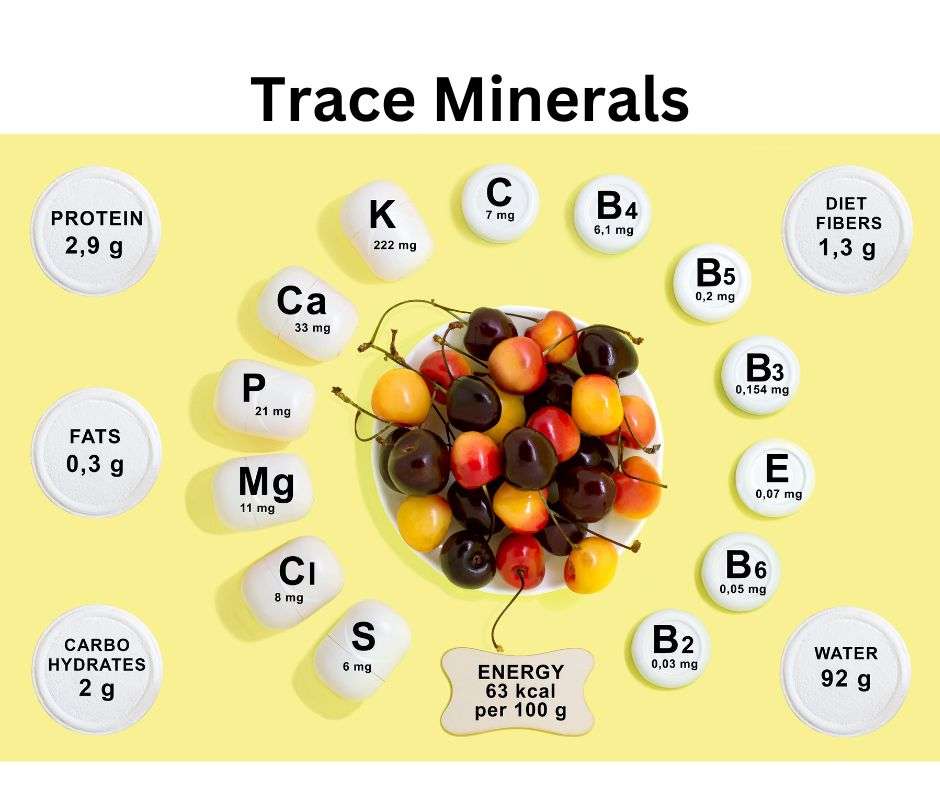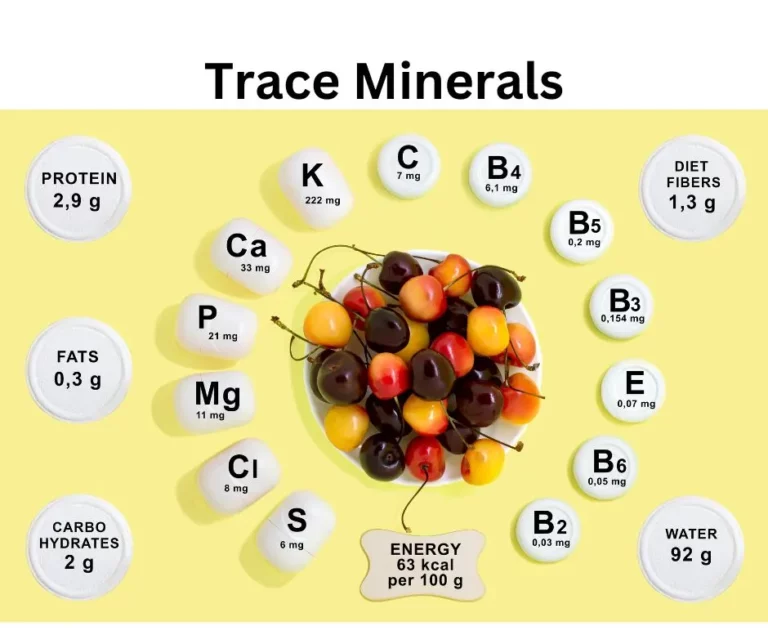Some minerals are essential to your health. Essential minerals are sometimes divided into 2 categories
1. Major minerals (Macrominerals) and
2. Trace minerals (Microminerals).
Macrominerals are needed in large amounts whereas trace minerals are needed in very small amounts. The macro minerals are calcium, phosphorus, magnesium, sodium, potassium, chloride, and sulfur. The Trace minerals are iron, manganese, copper, iodine, zinc, cobalt, fluoride, and selenium.
1. What are Trace Minerals?
Trace minerals are essential for the healthy functioning of the body, yet many don’t realize the critical importance of these elements.
These microminerals play a role in sustaining our health and vitality. Taking in the right amount of trace minerals helps protect us from a myriad of diseases and conditions. Without them, our bodies cannot function optimally.
2. What are the symptoms of low-trace minerals or mineral deficiency?
When you do not get enough minerals through food you might experience symptoms such as symptoms such as:-
1. Fatigue,
2. Slow metabolism,
3. Decreased Immunity and
4. Decreased mental health
5. Irregular heartbeat.
6. Nausea and vomiting.
7. Constipation and Bloating,
8. Muscle cramping
From vitalizing our immune systems to helping our cell growth, minerals are essential nutrients that do a lot to ensure our bodies are functioning at their optimal level.
3. How Can You Get Trace Minerals?

While there are various sources of trace minerals, taking a dietary supplement is a great way to ensure your body is meeting its mineral needs. With a diet that includes a variety of nutrient-rich foods and proper supplementation, you can get the trace minerals your body needs to help your body function at its optimal level.
It is essential to make sure that we are getting the necessary minerals in our diets. We should aim to eat a balanced diet that is made up of a variety of Legumes, Whole grains, and Green vegetables, and make sure that we are also supplementing our diet with trace minerals whenever needed.
Find below a list of trace minerals, their functions, and common foods that contain them.
1. Iron:- Iron
· Converts blood sugar to energy. …
· Boosts the immune system. …
· Aids cognitive function. …
· Supports healthy skin, hair, and nails.
Food Sources:- Dried Apricots, Cereals, pasta, and bread, Legumes such as red kidney beans, black beans, and chickpeas, Pumpkin seeds, Dark green vegetables such as spinach, Dark chocolate, Lentils, and Tofu, Quinoa
2. Manganese:- Manganese helps in
· Building Bones
· Boosts metabolism
· When combined with vitamin K, helps in wound healing.
Food Sources:- Oatmeal, Nuts, Legumes, Spinach
3. Copper:-
· Keeps Immune System healthy
· Helps in Collagen Formation
· Acts as an antioxidant.
Food Sources:- Seeds and nuts, Whole-grain products
4. Iodine:-
· To make thyroid hormones
· Bone development
· Brain development
Food Sources:- Dairy products such as Milk, Cheese, and Yogurt
5. Zinc:-
· Boosts Metabolism
· Supports normal growth and development during pregnancy,
· Antioxidant as it can help reduce oxidative stress
Food Sources:- Nuts, Breakfast cereals
6. Cobalt:-
· Making red blood cells (erythropoiesis)
· Supports the production of red blood cells
· Maintains the nervous system
Food Sources:- Oats, Green Veggies such as Spinach and Broccoli
7. Fluoride:-
· Protect your teeth by strengthening the outer enamel surface
· Build strong teeth and bones.
Food Sources:- Raisins, Potatoes and Oatmeal
8. Selenium:-
· Important for reproduction
· Helps in DNA production
· Protects the body from damage caused by free radicals
Food Sources:- Brazil Nuts, Cereals and Dairy Products
4. How Much Intake of Trace minerals is Necessary?
The recommended daily allowance for most trace minerals is between 2 and 15 milligrams. Be sure to talk to your doctor or nutritionist about your mineral needs and to figure out the best way to meet those needs. If you are considering taking a supplement, it may be worth researching which product will be best for you.
Conclusion
In this article, we explored the critical importance of trace minerals in our lives and the health of our bodies. Minerals are essential components of our entire system and are vital for our overall health. They help to support the growth and development of our organs and cells and they also help to make up the vitamins and hormones that are necessary for our well-being. We can get trace minerals from our food, supplements, and mineral-enriched waters.
Eating the appropriate amount of minerals can help us be healthier and live longer. So let’s make sure that our bodies get the nutrition they need from this vital micronutrient.
If you liked this article, do not forget to share it with your friends. Your comments would be much appreciated.
FREQUENTLY ASKED QUESTIONS
1. What is the best time to take trace minerals?
The best time is a few hours after a meal.
2. Who should not take trace minerals?
Those who are having liver or kidney problems should consult a doctor before taking any mineral supplements.
3. Can I take trace minerals with other supplements?
Yes, You can take minerals with other supplements.
4. Do trace minerals have side effects?
Yes, You might experience some side effects such as Nausea and runny nose, but nothing serious.


